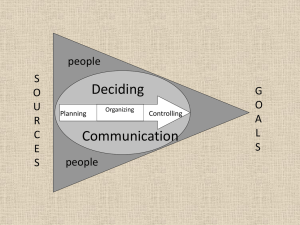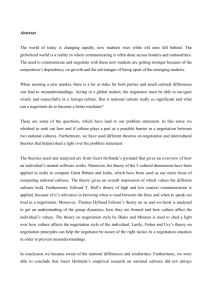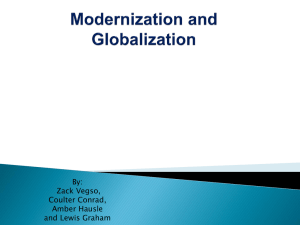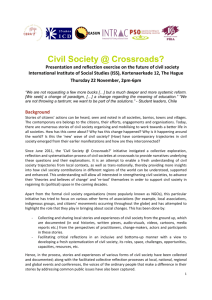urban planning, a culture of negotiation
advertisement
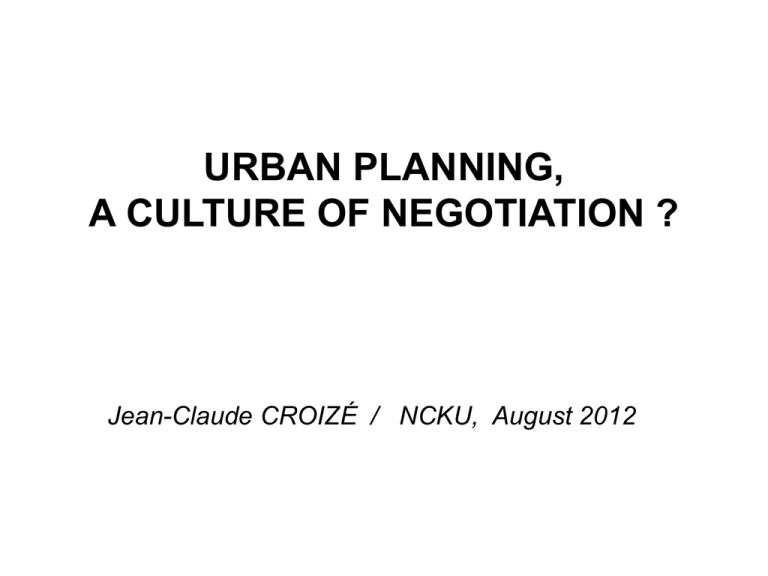
URBAN PLANNING, A CULTURE OF NEGOTIATION ? Jean-Claude CROIZÉ / NCKU, August 2012 Urban planning versus architecture • In both cases, a project consists in drawings and writings that outline a future for human space, but… • A complete architecture project is an order given to a building enterprise to realize an object, and realization is generally supposed to be completed rapidly (time-frame calculated in months). • On the contrary, urban planning involves a range of distinct objects, a large number of direct and indirect stakeholders, and realization will require years and years. Some stakeholders will appear or desappear during the process, while other ones will change their attitude towards the project. Professional sources for making plans • Views of authorities paying for planning, • Doctrinal views about valuable human settlements’ forms… and picturesque aesthetics; recently : environmental requisites (« green » projects), • Laws and regulations, • Economics : cost/benefit optimization (public budgets) and profitability (developpers and other stakeholders), • Infrastructure development logics. The latter and its technical requirements are often considered as more « objective », and therefore supposed to provide solid bases for planning. Nevertheless, infrastructure-based plans may fail, even if they are supported by governments or big business. Short stories of the 1980’s and 1990’s • Nakiska (Alberta, Canada) : when Indians refuse to sacrifice a sacred mountain to Olympic Gods… • Arizona (USA) : when the Navajo National Council rejects a project of dam… • Brides les Bains (northern Alps, France) : when Olympic Gods claim to have a telpher set up in a National Park… • Le Villard d’Arène (southern Alps, France) : when the Goddess of Electricity launches a dam in a National Park… Lack of negotiation : what happens ? Two major issues : • the plan will either fail, • or will be reworked by stakeholders, and what originally made sense will generally be lost. For the latter, an illustration can be found in the so-called Z.U.P. (Priority Urbanization Zones) experimented in France in the 1960’s and 1970’s. The one million dwellings built in these zones were supposed to create « normal » urban neighbourhoods. But those turned into « social projects’ ghettos », generating all sorts of problems until now, and for the coming decades. Democratic societies versus others • In societies where authorities enjoy full power, planners may replay « the King and his architects » : any project that appeals to the King will come to reality. • In democratic or semi-democratic societies, success stories in urban planning cannot only rely on authorities’ approval. They suppose also active co-operation of partners you must be reckoned with, and, if not a large approval by public opinion, at least, neutrality of directly affected population. Thus, constant negotiations are necessary, with partners or possible partners, and with local people’s representatives. Right from the start, and during the whole process ! Anything new ? • Negotiation is usually recognized as the only way to achieve a suitable and efficient planning in situations where « blank projects » are pure fantasies. • For instance : - commercial centers’ projects could not come to realization without co-operation of all stakeholders; - when dealing with built heritage, how could you act without co-operation of owners and inhabitants ? • What is new : the ongoing democratic progress in many countries (especially at local level) pushes negotiated planning forward as a general process, involving different partners and the people concerned. What « negotiate » means • « Negotiate » does not consist in giving lessons to other parties, nor in coaching them. • As a process aiming at joint decision making, it requires in the first place an aptitude of negociators to create a climate of mutual respect, confidence and comprehensive approach… despite all sorts of discrepancies (cultural and professional backgrounds, economic interests, etc.). • Further requirements are more or less « technical » : - relative openness of decision making, - emphasis on informal exchanges, - flexibility and availability of different options. Final statements « […] negotiating culture is associated with the functioning of democratic societies. » and, 2) « […] negotiation may well acquire a new standing as the only suitable substitute for coercion and violence. » 1) (Culture & negotiation, UNESCO, 1993, p. 53-54.) It may well acquire… so far the parties not only « decide » to follow this path, but also prove their ability to assume it.




